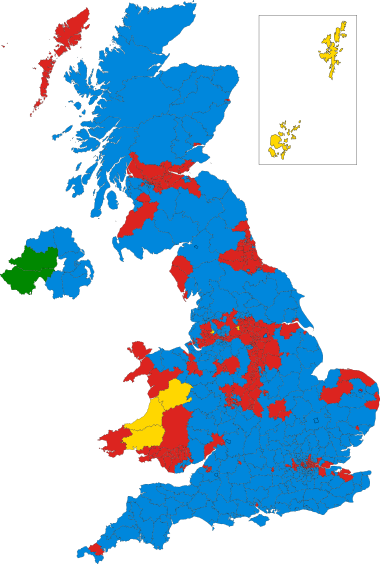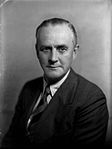United Kingdom general election, 1955
| |||||||||||||||||||||||||||||||||||||||||||||||||
All 630 seats in the House of Commons 316 seats needed for a majority | |||||||||||||||||||||||||||||||||||||||||||||||||
|---|---|---|---|---|---|---|---|---|---|---|---|---|---|---|---|---|---|---|---|---|---|---|---|---|---|---|---|---|---|---|---|---|---|---|---|---|---|---|---|---|---|---|---|---|---|---|---|---|---|
Opinion polls | |||||||||||||||||||||||||||||||||||||||||||||||||
| Turnout | 76.8%, | ||||||||||||||||||||||||||||||||||||||||||||||||
| |||||||||||||||||||||||||||||||||||||||||||||||||
 Colours denote the winning party—as shown in § Results | |||||||||||||||||||||||||||||||||||||||||||||||||
| |||||||||||||||||||||||||||||||||||||||||||||||||
The 1955 United Kingdom general election was held on 26 May 1955, four years after the previous general election. It resulted in a substantially increased majority of 60 for the Conservative government under new leader and prime minister Sir Anthony Eden against the Labour Party, then in its twentieth year of leadership by Clement Attlee.
This general election has since been described by many as one of the "dullest" post-war elections, because there was little change in the country,[clarification needed] with Labour steadily losing ground owing to infighting between the left (Bevanites) and the right (Gaitskellites). This resulted in an unclear election message from the Labour Party. It was the fifth and last general election fought by Labour leader Clement Attlee, who by this time was 72. Eden had only become leader of the Conservative Party a few weeks before the election, after the retirement of Winston Churchill, but he had long been considered the heir apparent to the Conservative leadership. The Conservatives were hoping to take advantage of the end of food rationing and the good mood created by the coronation of Queen Elizabeth in 1953. Eden himself was telegenic, although not a great public speaker, and gradual economic growth benefited the party greatly (BBC News 2005).
The 1955 election remains the last time the Conservative Party won the most seats in Scotland, and was also the last time it won the most Scottish seats of any unionist party until the 2017 election. After 1959, Labour established itself as the dominant party in Scotland at UK general elections, a position it maintained until the rise of the pro-independence Scottish National Party at the 2015 election.
For the first time, television took a prominent role in the campaign; this is the earliest UK general election of which television coverage survives (the 1950 and 1951 election nights were not recorded). Only three hours of the coverage, presented by Richard Dimbleby, was kept; this was rebroadcast on BBC Parliament on the 50th and 60th anniversaries of the date of the election.
On election day, the Daily Mirror had printed the front-page headline "Don't Let The Tories Cheat Our Children", urging its readers to elect Labour on the basis that it had "built a better Britain for us all" (Daily Mirror 2012).
|
|
|
|
|
Contents
1 Results
1.1 Votes summary
1.2 Seats summary
2 Selected declarations
3 Transfers of seats
4 See also
5 Notes
6 References
7 Further reading
8 External links
8.1 Manifestos
Results
This election was fought on new boundaries, with five seats added to the 625 fought in 1951.
The result showed very little change from 1951, with fewer than 25 seats changing hands and only a small swing from Labour to the Conservatives.
The only real highlight of the night was in Northern Ireland, where Sinn Féin won two seats in a British election for the first time since 1918 (before the partition of Ireland).
The Labour Party suffered at this time from deep divisions, yet for it this election was not the disaster it could have been.
Although little changed, this was a strong victory for the Conservatives, who won the largest share of the vote for a single party in a post-war general election.
The Liberal Party had yet another poor performance, only slightly improving their popular vote total from the previous election, and again winning just six seats. Five of their six seats did not have Conservative challengers, as per local-level agreements to avoid vote-splitting which likely would have thrown the seats to Labour; the only Liberal candidate to be victorious against both Conservative and Labour challengers was Orkney and Shetland MP Jo Grimond. The poor national showing was widely viewed as the death knell for the embattled leadership of Clement Davies, who resigned the following year and was replaced by Grimond.
Future Labour leader Michael Foot lost his seat of Plymouth Devonport at this election; he returned for Ebbw Vale in a 1960 by-election.
345 | 277 | 6 | 2 |
Conservative | Labour | Lib | O |
| Candidates | Votes | ||||||||||
|---|---|---|---|---|---|---|---|---|---|---|---|
| Party | Leader | Stood | Elected | Gained | Unseated | Net | % of total | % | No. | Net % | |
| | Conservative | Anthony Eden | 624 | 345 | +23 | 54.8 | 49.7 | 13,310,891 | +1.7 | ||
| | Labour | Clement Attlee | 620 | 277 | 1 | 19 | −18 | 44.0 | 46.4 | 12,405,254 | −2.4 |
| | Liberal | Clement Davies | 110 | 6 | 0 | 0 | 0 | 1.0 | 2.7 | 722,402 | +0.2 |
| | Sinn Féin | Paddy McLogan | 12 | 2 | 2 | 0 | +2 | 0.3 | 0.6 | 152,310 | +0.5 |
| | Plaid Cymru | Gwynfor Evans | 11 | 0 | 0 | 0 | 0 | 0.2 | 45,119 | +0.2 | |
| | Independent | N/A | 8 | 0 | 0 | 0 | 0 | 0.2 | 43,791 | +0.1 | |
| | Communist | Harry Pollitt | 17 | 0 | 0 | 0 | 0 | 0.1 | 33,144 | 0.0 | |
| | Irish Labour | William Norton | 1 | 0 | 0 | 1 | −1 | 0.1 | 16,050 | 0.0 | |
| | Independent Labour | N/A | 2 | 0 | 0 | 0 | 0 | 0.1 | 15,322 | N/A | |
| | SNP | Robert McIntyre | 2 | 0 | 0 | 0 | 0 | 0.1 | 12,112 | 0.0 | |
| | Ind. Labour Party | Annie Maxton | 2 | 0 | 0 | 0 | 0 | 0.0 | 3,334 | 0.0 | |
Government's new majority | 60 |
| Total votes cast | 26,759,729 |
| Turnout | 76.8% |
Votes summary
Seats summary
Selected declarations
- First declaration: Cheltenham (Con: 24,259, Lab: 16,638; Con hold)
Prime Minister's seat: Warwick and Leamington (Con: 29,979, Lab: 16,513; Con hold)
Transfers of seats
- All comparisons are with the 1951 election.
- In some cases the change is due to the MP defecting to the gaining party. Such circumstances are marked with a *.
- In other circumstances the change is due to the seat having been won by the gaining party in a by-election in the intervening years, and then retained in 1955. Such circumstances are marked with a †. The parliament of 1951–55 only saw one by-election where a seat changed hands (Sunderland South), and unusually this was a gain for the party in government.
| From | To | No. | Seats | ||
|---|---|---|---|---|---|
Labour | Labour (HOLD) | many | Ashfield (replaced Broxtowe), Barons Court (replaced Hammersmith South), Blackburn (replaced Blackburn East), Fulham (replaced Fulham East), Glasgow Provan (replaced Glasgow Camlachie), Hackney Central (replaced Hackney South), Hull West (replaced Hull Central), Manchester Openshaw (replaced Droylsden), Midlothian (replaced Midlothian and Peebles), Nottingham North (replaced Nottingham East), Nottingham West (replaced Nottingham North West), Reading (replaced Reading South), Walsall North (replaced Walsall), et al. | ||
Liberal National | 2 | Bradford West (replaced Bradford Central), Plymouth Devonport | |||
Conservative | 19 | Ayrshire Central, Carlisle, Ealing North, Gloucestershire South, Gravesend, Halifax, Hornchurch, Leeds North East, Liverpool Kirkdale, Maldon, Nottingham Central, Nottingham South, Preston South, Southampton Test, Sunderland South†, Walthamstow East, Wandsworth Central, Watford, The Wrekin | |||
abolished | 6 | Birmingham Erdington, Fulham West, Glasgow Tradeston, Leeds Central, Manchester Clayton, Sheffield Neepsend | |||
Irish Labour | UUP | 1 | Belfast West | ||
Nationalist | Sinn Féin | 1 | Fermanagh and South Tyrone2 | ||
Independent Republican | 1 | Mid Ulster1 | |||
Liberal | Liberal (HOLD) | 6 | Bolton West, Cardiganshire, Carmarthen, Huddersfield West, Montgomery, Orkney and Shetland | ||
Liberal National | Liberal National (HOLD) | 17 | Angus North and Mearns, Angus South, Bedfordshire South, Bradford North, Denbigh, Dumfriesshire, Fife East, Harwich, Holland with Boston, Huntingdonshire, Luton, Newcastle upon Tyne North, Norfolk Central, Renfrewshire West, Ross and Cromarty, St Ives, Torrington | ||
Conservative | Labour | 4 | Bristol North West, Glasgow Govan, Norfolk South West, Romford | ||
Conservative (HOLD) | many | Birmingham Selly Oak (replaced Birmingham King's Norton), Croydon NE (replaced Croydon East), Croydon NW (replaced Croydon North), Croydon South (replaced Croydon West), Howden (replaced Beverley), Roxburgh, Selkirk and Peebles (replaced Roxburgh and Selkirk), Stroud (replaced Stroud & Thornbury), et al. | |||
Speaker | Cirencester and Tewkesbury* | ||||
abolished | 2 | Blackburn West, Leeds North, Reading North | |||
UUP | UUP | 9 | North Antrim, South Antrim, Armagh, Belfast East, Belfast North, Belfast South, Down North, Down South, Londonderry | ||
Seat created | Labour | 5 | Birmingham All Saints, Erith and Crayford, Feltham, Leeds East, Meriden | ||
Seat created | Conservative | 9 | Chigwell, Eastleigh, Essex South East, Glasgow Craigton, Hertfordshire East, Nantwich, Rye, Surbiton, Walsall South | ||
.mw-parser-output .refbegin{font-size:90%;margin-bottom:0.5em}.mw-parser-output .refbegin-hanging-indents>ul{list-style-type:none;margin-left:0}.mw-parser-output .refbegin-hanging-indents>ul>li,.mw-parser-output .refbegin-hanging-indents>dl>dd{margin-left:0;padding-left:3.2em;text-indent:-3.2em;list-style:none}.mw-parser-output .refbegin-100{font-size:100%}
1 Sinn Féin winner overturned on petition for a criminal conviction. The second-placed Ulster Unionist candidate was also overturned by resolution of the House; eventually the 1956 by-election was held, which returned an Independent Unionist.
2 Sinn Féin winner overturned on petition for a criminal conviction. The second-placed candidate, an Ulster Unionist, was awarded the seat.
See also
- MPs elected in the United Kingdom general election, 1955
Notes
^ Conservatives include 19 National Liberals and 10 Ulster Unionists.
References
1955: Eden given mandate, BBC News, 5 April 2005, retrieved 19 May 2018.mw-parser-output cite.citation{font-style:inherit}.mw-parser-output q{quotes:"""""""'""'"}.mw-parser-output code.cs1-code{color:inherit;background:inherit;border:inherit;padding:inherit}.mw-parser-output .cs1-lock-free a{background:url("//upload.wikimedia.org/wikipedia/commons/thumb/6/65/Lock-green.svg/9px-Lock-green.svg.png")no-repeat;background-position:right .1em center}.mw-parser-output .cs1-lock-limited a,.mw-parser-output .cs1-lock-registration a{background:url("//upload.wikimedia.org/wikipedia/commons/thumb/d/d6/Lock-gray-alt-2.svg/9px-Lock-gray-alt-2.svg.png")no-repeat;background-position:right .1em center}.mw-parser-output .cs1-lock-subscription a{background:url("//upload.wikimedia.org/wikipedia/commons/thumb/a/aa/Lock-red-alt-2.svg/9px-Lock-red-alt-2.svg.png")no-repeat;background-position:right .1em center}.mw-parser-output .cs1-subscription,.mw-parser-output .cs1-registration{color:#555}.mw-parser-output .cs1-subscription span,.mw-parser-output .cs1-registration span{border-bottom:1px dotted;cursor:help}.mw-parser-output .cs1-hidden-error{display:none;font-size:100%}.mw-parser-output .cs1-visible-error{font-size:100%}.mw-parser-output .cs1-subscription,.mw-parser-output .cs1-registration,.mw-parser-output .cs1-format{font-size:95%}.mw-parser-output .cs1-kern-left,.mw-parser-output .cs1-kern-wl-left{padding-left:0.2em}.mw-parser-output .cs1-kern-right,.mw-parser-output .cs1-kern-wl-right{padding-right:0.2em}
Craig, F. W. S. (1989), British Electoral Facts: 1832–1987, Dartmouth: Gower, ISBN 0900178302
"General Election 2010 – A century of Daily Mirror front pages", Daily Mirror, 3 February 2012, retrieved 19 May 2018
Further reading
Butler, David E. (1956), The British General Election of 1955, the standard study
External links
- United Kingdom election results—summary results 1885–1979
Manifestos
United for Peace and Progress: The Conservative and Unionist Party's Policy, 1955 Conservative Party manifesto
Forward With Labour: Labour's Policy for the Consideration of the Nation, 1955 Labour Party manifesto
Crisis Unresolved, 1955 Liberal Party manifesto


